This column is supposed to be about visual arts. That makes sense as I am an artist, but I am also a writer (as Jack Mackenzie) but above all of that I am just a great big geek who loves science fiction.
If you are a fan of science fiction and if, as I do, you have a particular love for space opera, then you probably have come across the name Perry Rhodan.
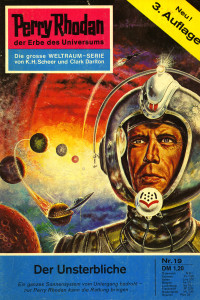 If you’re anything like me then you would have spent many hours scouring paperback aisles or racks looking for science fiction paperbacks. Sometimes in drug stores or supermarkets or maybe in second-hand book stores. Either way you are bound to have come across a paperback edition or two of the Perry Rhodan books. The English editions, anyways.
If you’re anything like me then you would have spent many hours scouring paperback aisles or racks looking for science fiction paperbacks. Sometimes in drug stores or supermarkets or maybe in second-hand book stores. Either way you are bound to have come across a paperback edition or two of the Perry Rhodan books. The English editions, anyways.
And if you are like me you would have asked yourself: what is this Perry Rhodan thing? And you probably would have been warned away from it as I was many times.
Perry Rhodan is a weekly German science fiction pulp magazine series that has run uninterrupted since 1961. That translates into over two thousand five hundred issues released so far not counting reprints, books and spinoffs.
Lets let that sink in for a moment. Can you think of a similar North American science fiction hero who has had such a run? The closest I can think of is Doctor Who and his run was certainly not uninterrupted.
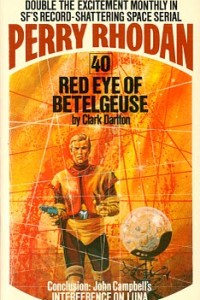 Does this not sound like the most successful science fiction series ever? So how come hardly anyone outside of Germany knows about it?
Does this not sound like the most successful science fiction series ever? So how come hardly anyone outside of Germany knows about it?
The magazine was originally founded by Karl-Herbert Scheer and Walter Emsting, two German science fiction writers. Initially it was only conceived to run for thirty volumes, which was ambitious enough. Its popularity within Germany allowed it to run well past the original thirty volumes and now it is still being developed and written by an ever-changing team of authors.
So what is Perry Rhodan all about? Well, according to Perry-Rhodan.us:
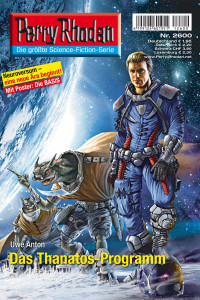 The series begins with the first manned moon landing (in 1971) led by U.S. Space Force Major Perry Rhodan. However, things do not go as planned and the astronauts discover a stranded alien spaceship from a star system called Arkon and its crew who need medical help. The realization that mankind is not alone in space and access to the aliens’ advanced technology lead to the (not entirely trouble-free) political unification of Earth under the eponymous hero-protagonist Rhodan, first expeditions into the cosmic neighborhood, and the eventual founding of first colonies on other planets, all the while trying to keep the more powerful established factions out there (especially the decadent Empire of Arkon, which had dominated local space for twenty millenia) from finding out just where the newcomers hail from.
The series begins with the first manned moon landing (in 1971) led by U.S. Space Force Major Perry Rhodan. However, things do not go as planned and the astronauts discover a stranded alien spaceship from a star system called Arkon and its crew who need medical help. The realization that mankind is not alone in space and access to the aliens’ advanced technology lead to the (not entirely trouble-free) political unification of Earth under the eponymous hero-protagonist Rhodan, first expeditions into the cosmic neighborhood, and the eventual founding of first colonies on other planets, all the while trying to keep the more powerful established factions out there (especially the decadent Empire of Arkon, which had dominated local space for twenty millenia) from finding out just where the newcomers hail from.
Over time (over the course of the entire series so far, more than three thousand years pass in-universe), Earth and its colonies evolve into a major power in their own right while other space-faring races lose some of their traditional influence.
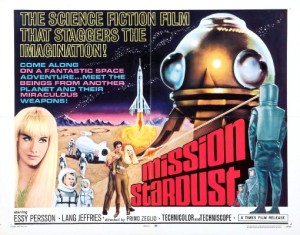 Well that all sounds pretty standard space opera, doesn’t it? There are elements of Doc Smith’s Lensman stories as well as Star Trek. But why has Perry Rhodan lasted for so long, achieved this level of popularity in Germany but not elsewhere in the world? How can a franchise inspire Books, spin-offs, games, music albums (including one by Tangerine Dream’s Christopher Franke) and even a movie back in 1966 (although Perry Rhodan fans will tell you that there never was a movie made… EVER! That’s how bad it was) and not have been able to break out of its regional popularity the way Doctor Who has? Is it a German thing? Does it not translate outside of the German cultural ouvre?
Well that all sounds pretty standard space opera, doesn’t it? There are elements of Doc Smith’s Lensman stories as well as Star Trek. But why has Perry Rhodan lasted for so long, achieved this level of popularity in Germany but not elsewhere in the world? How can a franchise inspire Books, spin-offs, games, music albums (including one by Tangerine Dream’s Christopher Franke) and even a movie back in 1966 (although Perry Rhodan fans will tell you that there never was a movie made… EVER! That’s how bad it was) and not have been able to break out of its regional popularity the way Doctor Who has? Is it a German thing? Does it not translate outside of the German cultural ouvre?
I guess the question I’m really asking is: Is it any good?
 At this point I should come clean and tell you that I have not read any Perry Rhodan. I have several of the English language paperbacks but I have never read them. I have been warned away from the books by fellow science fiction fans, yet, there is an appealing allure about the existence of such a successful franchise that very few people, even the science fiction community, has even heard about.
At this point I should come clean and tell you that I have not read any Perry Rhodan. I have several of the English language paperbacks but I have never read them. I have been warned away from the books by fellow science fiction fans, yet, there is an appealing allure about the existence of such a successful franchise that very few people, even the science fiction community, has even heard about.
My question then is the one in the title of this piece: What the %&*# is Perry Rhodan? Who out there knows and can share what it is about this series that has captured your imagination?
Who out there knows just what this Perry Rhodan thing is all about? Who out there knows and can tell me why it has endured? And who has any theories about why it hasn’t become a breakout world-wide success like other sf franchises?
Don’t be shy. I won’t judge. I just want to know what its all about.

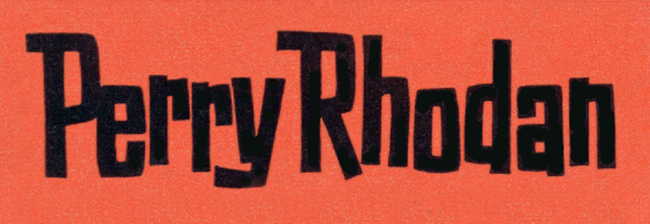

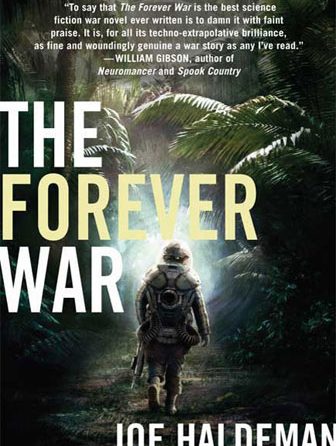








Good reading in these comments. I was a follower of the 1970s English translations, that’s the Perry Rhodan I know… back then the series was up to about 500 issues in Germany and that was daunting… now, at 3000 issues, I’m likely to never truly know the vast scope so often described.
“Lets let that sink in for a moment. Can you think of a similar North American science fiction hero who has had such a run?”
Batman has appeared in over 14358 issues. Superman 13164. Wolverine 12912. Spider-Man 12164.
Comic books are the most prolific form of science fiction pulp in North America. With an average of 24 pages per issue, each issue will be 1/4th the length of a Perry Rhodan book. – They’ll also have significantly fewer words due to being a visual medium, however a lot of words in Perry Rhodan books will be describing how things look, where comics can just show you, so I think it’s basically a wash when it comes to how much is happening per page.
Therefore we could reasonably say that Batman has appeared in the equivalent of 3589 pulp novels of Perry Rhodan length, handily beating out Rhodan’s own number by almost a thousand novels.
This makes sense, since Batman did have a significant lead on him, having first been published in 1939. And because comics will often have more than one series running simultaneously that features the same characters, where as Perry Rhodan only has the main line and then a few Atlan books. Batman could easily feature in a dozen different comics in a week, where even with their fast release rate Rhodan could only be featured in one.
I really do think Comic Books are the most appropriate cultural reference point when trying to explain Perry Rhodan to North America. They occupy a similar niche, tend to be looked at the same way by a majority of the population, often intimidate people with their length and complexity, people often complain about being confused when characters show up from far back in the canon, both focus on superhuman characters that tend to suffer from Power Creep over time until they are functionally deities, both are released in short easily digested issues on a regular basis (Perry rhodan is weekly, comics are monthly but publish more, often featuring dozens of simultaneous series), most fans will only tune in sporadically while a few dedicated fans will spend their life reading every piece of canon they can get their hands on, etc.
In Germany they had Perry Rhodan the man who went to the moon, in America we had Superman the last son of Krypton. Same shit.
My initial reaction to your point was that it was like comparing apples and oranges, but, upon reflection, you make a compelling point! I can’t really argue with that.
Apparently the Perry Rhodan series was popular in Japan too, cited by Nobel Prize-winning researcher Shinya Yamanaka as a favorite when he was growing up.
Well here’s an essay of mine in German. Just throw it into a translate machine like deepl.com and you’ll have reflected information on the theme.
https://www.editiondaslabor.de/blog/2014/11/15/mein-klassiker-mit-zukunft-perry-rhodan/
As has been remarked upon there is a big difference between early Rhodan and later. The main influence in this, in my opinion, was William Voltz (real name Wilhelm Karl Voltz, also known as Willy Voltz). He became the chief editor, the one who writes the general plot, and humanized the series. Sadly he died young (aged 46) and the series changed after him but his legacy endures. From volume 650 to 1200 he was directly involved.
He also initiated the Silberband series, books of about 400 pages that contain a reworked version of 5 to 10 volumes. Mainly errors are corrected, overhead from repetitions are removed and while in the series volumes switch between paralel strorylines, here they are grouped together. More importantly he was directly responsible for the first 19 volumes (covering the first 167 volumes, mostly). He reworked them so that the worst pulpiness was changed or left out. He left out volumes that did nothing for the series (as you said it was originally ot meant to go past 30 and later 50 volumes). He rewrote some of the borderline racist and sexist passages without gutting it. If anything he made it how it should have been and partly would have been had they known that it would become decades spanning series.
His main invention in the series is the onion layer model in which stages of evolution have superbeings in a hierarchy. Humans are stage 4 and stage 5 is when a complete race becomes one entity without a physical presence. His best cycle (in the way of seasons on TV Rhodan is divided into cycles of mostly 50 to 100 volumes) was Die Aphilie (an invented word meaning ‘without love’), in which the Earth was moved to a different star which radiation caused most people to lose their emotions. It explored the meaning of love, emotions and rational thinking quite nicely for a series like this.
One of my favorite characters is Voltz’ Alaska de Saedelaere, a loner and essentially a sympathetic emo 😛
Of course with the production volume of Perry Rhodan you can’t have Shakespeare level literature but there is more than enough good stuff. It’s even more the experience of the whole then anything else.
As a twen I read the first 400 episodes, but not the magazines, but the hardcover edition, which was freed of inconsistencies. Especially the cycle of the Masters of the Island fascinated me. Later on I lost tracks and never got into it again, but I from time to time a tried to read about current developments.
I’ve read some of the early issues and a lot of the current ones. You can’t really compare them imho. The old stuff from the sixties is classic scifi pulp with some pretty questionable actions and opinions (“Let’s teach those Russians a lesson and make 10.000 of them deaf!”). The current issues however are far more complex, more deep and generally thought provoking. It’s still pulp, but the good way.
Some problems I have: The stories are highly plot-driven and the characters more or less pretty stereotypical. Take Rhodan for example (who isn’t in the spotlight so much anymore although he’s still a very important character). Sure he matured as a character and is far more wise (he is, after all, more than 3000 years old by now). But in the end there are not too many personal struggles more than “I lost too many loved ones” or “did I messed with the timeline when I travelled 20 million years in the past?”
Second, it’s almost too complex for newbies. I had to read the perrypedia simultanously to understand what the heck was going on, who was who etc. And even then they threw storyelements at me I just couldn’t comprehend. From time to time the characters meet entities or people they met 100-500 issues ago. And while this may be nice for people who’ve read all that stuff, I was just annoyed at some point.
But I would wholeheartedly recommend Perry Rhodan nevertheless. If you speak German, grab the current issues, open perrypedia and give it a shot.
What’s most amazing for me ist the scope of the stories. I’ll compare it to Star Wars: You want a ball-shaped spaceship with the capability to destroy a planet? Take like every single destroyer ship-class from the Perryverse. You want a big space battle? How about fighting 20.000 ships plus fighters and support units, each of them basically being a Death Star? If Perry Rhodan would be informed that an Imperium would have built a Death Star and threatens that one part of the galaxy, he would probably say: “Come on man, I have more important things to deal with.”
I also like the humor from time to time. There’s this one important meeting where they have to discuss the fate of the galaxy with a delegation of an enemy race. They all accuse each other and argue. Now, this particular race has the habit of being socially awkward and the only situation they open up is when they take a shit (seriously). They do all they’re business while sitting on the toilet. So one of the diplomats stands up and says: “Enough of this! You, you and me, we’re going to take a shit now!” And that basically solves the problems. It was ridiculous and I laughed out loud when I read this.
So, yeah, Perry Rhodan has its flaws, not every issue is great. But if you really want to dive deep into a big, wide SciFi epos, read it. (in German)
I started reading them at a young age, like 13 and I’ve been a fan ever since. I got them from a friend of my brothers, his name was Perry too, and I suppose that’s why HE had them. The ones I had were 13 through 28, with some missing.
Later, when I got cancer and I thought I was done for, I went out and bought the first 800 or so for 300 Euros, a bargain. I tried to read them all, but when I got cured, life took over and haven’t got around it since, But this month I’ve started up again.
About the series themselves, only the first 50:
Yes, it most redeeming feature is the sheer size of it all. It’s daunting, It’s depressing to think about. but still.
Then there are the characters, which are mostly sympathetic people and one alien (Gucky in German and Pucky in English), and with whom one can identify. I think around number 400 or 500 there’s the Vario-500 robot as well.
At times, the story line is very compelling and very exciting. As these things go, there are different storylines with different protagonists.
The big drawbacks are the bad writing, the really annoying and nasty personality of Rhodan himself, the really, really big holes in the stories and the way they speak in overly dramatic, shouty, overemotional fashion. It’s definitely German in that sense. And OLD fashioned German.
Rhodan is irritable, unkind, mean and annoying. He’s described as a kind of superman, who holds everyone, including the Arkonides, those from the Galactic Empire, under hypnotic, mesmerizing control. He’s nasty even to his best friend Reginald Bull, whom he treats as a side kick. He tells him repeatedly Bull is just there to follow
ordershis lead and his alone. In one exchange, Bull talks back to him and Rhodans response is that if he were a dictator, Bull would be in prison right now. I mean ???If one would be unkind, he could be described as an idealized Hitler, but done “right” this time. Of course, he isn’t racist! Nooooohoooo, it’s that sort of sixties scifi too: Racial differences are of no importance, it’s the future. Yet, the Japanese are all described in highly stereotypical fashion, but not overly so, remember, Germans respect Japanese immensely. But the lone black character is “African”. Just that. because, you know, Africa is a country.
Is it then “merely” militaristic? One could make a good case for that, and one could see the reason for that, after all, Earth has just discovered it’s like an island in the Pacific, surrounded by dozens of nuke possessing Americas, Russia’s and Chinas. And they all want SOMETHING from us.
And you’re really rooting for them, on that front.
I should say, there’s no pushing of any ideology like Heinlein does in The Moon is a harsh mistress, with its small government fetish or Starship Troopers where militarism is pushed as the ideal form of government. The political stuff is left to the nations of Earth, they have to decide all that boring administrative stuff out amongst themselves. Rhodan merely orders the world to form a one world government. Oooooh New World Order !?!?! Not so fast. He wants a one world government, because A: infighting could get us all destroyed, and B: he doesn’t wanna be bothered, he want to fly to distant planets and have adventures. Of course he doesn’t say that, he says that he’s off to other worlds to find really big and huge weapons and ships so as to defend Earth. He really doesn’t give a flying F***K how the rest of the world does it, as long as it gets done. He does have a minister of Finance, who is a Madoff/Micheal Milken type figure but who is also a type of financial/mathematical genius who can make money out of thin air. Desperately needed for the fledgling state the worlds only super power, the Third Power …
Which brings me to the odd and anoying plot holes: At the start of the series, there are 3 major powers, US, Soviets and China, Yet Rhodan founds a new country called the THIRD power not FOURTH Power.
It really sounds as though you have only read the very early stories, the series has evolved far beyond those origins. I’ve read all those early ones too but recently read #2800 and the difference is like chalk and cheese … far more sophisticated conceptually, with better characterisation too. Rhodan’s character has also certainly evolved considerably from the beginning, and the shortcomings of his personality that you mention above have been addressed and modified by many of the writers who came later (particularly William Voltz)
As of now, Clark Dalton is the WORST writer, and Kurt Mahr is the best.
the character of Rhodan differs under these two. AFAIK, “Bad Rhodan” appears only in the Dalton episodes. Arm chair psychology would suggest that Dalton is a frustrated guy with an inferiorty complex, while Mahr is not.
That is surprising to me, as I recall that of the original writers, the Rhodan character was at his worst under KH Scheer rather than Darlton. I didn’t think much of Kurt Mahr’s early stories but his later ones (especially in the 1300+ series) were a lot better. Mahr wins the award for dumbest line (I can still remember the gist of it even 35 years later) with his “the expedition made good progress through the jungle, despite the fact that they were hampered by the presence of a woman” !!!!!
Hi, I have been reading Perry Rhodan for 34 years. During my teens I was often reading 5 at a time (there were 5 parallel editions then which allowed you to catch up) and as a result I read all of them and still read it now. I also have been living in the UK for 22 years.
So what’s great about it? In a nutshell, it comes down to incredible storytelling. The series is typically structured into cycles (100 issues) and mega cycles which all build on top of each other. Cycles typically play out in several different locations (galaxies or universes), which all build an incredible arch of suspense over two years. The writing style and quality is fairly consistent and good, with 2-3 fantastic paperbacks every 10 issues, offset by a few less good ones. It has to be said that the quality of writing is of much higher quality these days, than it was at the beginning.
The series evolved from the expansionary phase of the human race and to attempts to build a galaxy wide federation over 3000 years. While the mysteries of the universe are being uncovered. The series is underpinned by its own theory of evolution, by which galactic civilisations eventually evolve into sentient beings, which meddle and roughly fall into 2 warring camps. That sets the scene for conflicts across galaxies and invasions of the milky way (of which there have been many). The science has evolved too. The attention to detail in the series is incredible.
The series has covered pretty much every conceivable topic from mutants, to time travel, to matrix type environments, wars (intra and extra galactic), travel to other universe, weird and wonderful civilizations and ideologies… anything that has come up in sci fi so far. Creating a rich and diverse universe. And constantly interwoven. It is quite common place that mysteries which were not answered 15 years ago, will be gradually resolved in a current cycle.
So why hasn’t it picked up outside of Germany? I think the answer is simple. Starting a translated series from the beginning, will not lead to enough sales as it is outdated and won’t hit the taste of readers today. Also the early episodes are quintessentially post war German, whereas later cycles have a universal appeal. Starting somewhere later is challenging as readers will not have the legacy. Yes, there are ‘history books’ summarizing the history of the Perry-verse. But from a commercial perspective, the barrier of entry world be extremely high. Also, it is notoriously hard to translate German well into English. So in the end the financial risks would just be you high.
Hope this helped
Lars
Just noticed a few typos. Apologies, was writing this on my phone
I have also been a long time fan of Perry Rhodan.
Here in France, they release one book every month so I have read (at least) one Perry Rhodan book every month since 15 years.
Love the story and the characters.
I have to admit I have been a long-time fan of Perry Rhodan … I read all of the available English language Ace Books as they first came out, when I was in my early teens. Came back to the series of as an adult.
It is very popular to look down your nose at the series, and I have read huge volumes of criticism and dismissals, much of which I suspect comes from people who have only read ABOUT Perry Rhodan, but never gave the series an actual read.
The more high-brow SF reading public often adopts the elitist attitude that anything that popular, merely because it is so popular, cannot possibly have any merit. In 1975, Robert Silverberg even referred to the series as the sci fi ghetto and blamed it for his ability to sell his own work. It is easy to poke fun at Forry Ackermann’s bad puns, neologisms and dominant, “clown prince of sci fi” personality in the original, English “maga-books”. More recently, some absolutely ludicrous pseudo-scholarship has appeared on the Web, that finds the whole series a coded manifesto for fascism (because, of course, anything German simply HAS to have neo-Nazi roots.)
I am not going to argue that series writing rises to the level of Shakespeare. And yes, some of it is dated. (But then, everything available in English is 50 years old, after all.) But the sheer scope of the series, its unbelievably audaciousness, are, to my mind, unparalleled in pulp/scifi history.
And for the vast, non-German speaking sci fi world who, if they have heard if it at all, know nothing about Perry Rhodan, it is very important to recognize it came BEFORE the original Star Trek, Star Wars, ST-the Next Generation and the Borg, X-men … So all those “cliches” some critics write about are actually concepts that ORIGINATED in the ghetto that is Perry Rhodan.
Thank you, MarK! This is exactly the kind of response I was hoping i would get. I know there are passionate Perry Rhodan fans out there and I was hoping to hear from a few of them!
StarTreck, Star Wars and nearly all other science fiction writings, series and movies are nothing else than a bad copy of Perry Rhodan.I believe a lot of their Ideas are copyrights from the origin. A proper Perry Rhodan movie would by far exceed any science fiction movie that ever have existed on this planet. I have read nearly all 3000 copies, nothing in existing science fiction comes even near to this story.
And ad to it. A lot of Americans are German Origin and I think the German language is no barrier to them reading this sf series